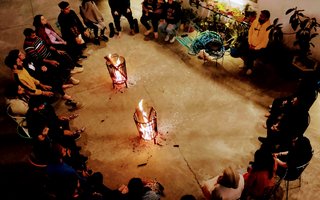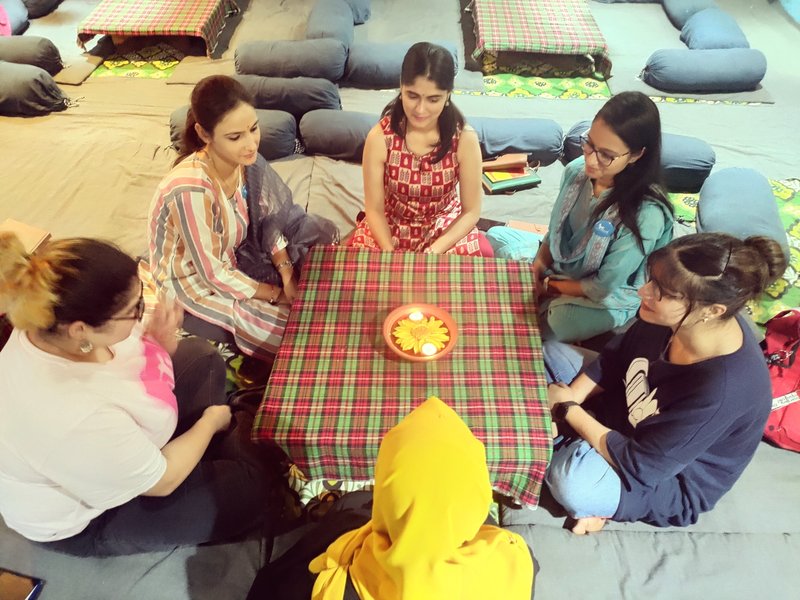Negotiating Contested Spaces: Building Peace
Ashima Kaul writes about Yakjah as a model of peacebuilding across divided communities, and its role in building space for dialogue and softening hardened identities.

Sufis in Kashmir are revered by both Hindus and Muslims. Their Mazars (shrines) are dotted across the region’s landscape. Prior to 1990, this would have been ‘normal practice’. However, in an era ravaged by violence and violent extremism, the space is rejected by those who differ ideologically on the issue of religion and religious practices. Interestingly, the Hindus in the group didn't hesitate to ‘step in’. However, the Muslims in the group, who consider visiting shrines as shirk (‘shirk’ in Islam is used to refer to idolatry or polytheism), didn’t enter the premises.
Religious identities in Kashmir based on schools of thought/ideology are non-negotiable. This is a phenomenon that has emerged and hardened over the last three decades of conflict. The Valley, with its rich diversity of thought, was known as the abode of Hindu saints with their timeless philosophies of consciousness, as well as Muslim Sufis who carried forward the message of love but are deeply polarised today. People are unwilling to negotiate their identities. Closeted within ‘identity’ boundaries based on history, memory and politics; they dismiss the ‘other’. However, within Yakjah, these identities soften, exhibiting a willingness, if not a complete openness, to embrace the diversity of thought and ideology.
Safe spaces for trust
Josie Gardener, a Ph.D. scholar from New South Wales University currently working on a thesis using Yakjah’s model of peacebuilding – focused on deep healing and forming connections by embedding community and cultural values in the process– attributes the acceptance of each other’s identities to the deep healing work that happens through this peacebuilding approach. “The process of building dialogical space allows a diversity of thoughts and experiences to be negotiated without feeling threatened”, she said while unpacking a process that is being examined in her forthcoming thesis. She added, “Contact is important, and it is the essential basis, but it can go wrong if a trusted space is not created through healing”.
On this note, Gardner referred to the contact hypothesis, a theory in psychology which suggests that prejudice and conflict between groups can be considerably reduced if the members or communities from divided groups interact with each other.
She also observed that by bringing together the right elements –trust, a sense of safety and trauma-sensitive facilitation– and doing certain rituals, the outwardly rigid politicized identities begin to dissolve, allowing inner emotional identities marked by vulnerability to create an apolitical and non-threatening space. “These might seem like simple processes, but the healing of the inner self brings huge shifts in relationships”, remarked Gardner.
Religious beliefs aren’t the only contested spaces in Jammu and Kashmir
Identities formed on the basis of political ideologies, narratives and notions based on the ideas of nationality, peace, justice, and security, are also deeply contested ones. Despite an absence of ‘live active violent conflict’ since 2019, people across the spectrum are still holding on to their acquired identities, rather sharply. While traveling together to revered and sacred spaces, we observed the contrasting transition from an externally contested area to a vulnerable space of compassion and caring.
“We have differing perspectives and positions on many issues”, said Aamir, a Sunni Muslim from Kashmir, “but those do not divide us”, he adds. According to Aamir, the healing workshops give them an opportunity to see through the other person’s feelings as a human being. “Once we have seen the emotions of a person, we are able to create a space for acceptance”, he says. Zahak, a Shia Muslim from Ladakh, agrees with Aamir. “We come from diverse social and cultural conditioning, yet we have been able to negotiate our differences through conversations and dialoguing on contentious issues”. Zahak and Aamir have been with the Yakjah Reconciliation and Development Network for almost a decade. They have participated together in several residential workshops on ‘healing and transformation’, helping and enabling them to ‘perceive’ situations and relationships differently. “The methodology of storytelling strategically used in Yakjah for sharing personal experiences opens a vulnerable space. We are able to see each other’s humanity”, says Zahak. “Our politics, perspectives, and positions drop, and kind of melt in the space. We try not to hurt one another and accept each other as we are”, remarks Aamir. They both have started a collaborative business venture.
Communicating emotional identities
Anamika a Dogra Hindu from Jammu, working on a collaborative project with Urzeeba, a Kashmiri Muslim from the Valley, opines that humans have similar emotional identities like love, fear, grief and happiness. “Emotions are our innermost identities. While our outer identities influence these, they fall when we share our sense of loss, pain, aspirations and hope. Urzeeba and I have a common desire to bring livelihood for the women artisans we work for. It forms a human connection that overrides our political identities”.
Perhaps the process is much more complicated than it seems to be. In real-life encounters with adversaries negotiating contested spaces is not easy, unless there is a mindful facilitative healing intervention. By listening through empathy and looking beyond a single-story dimension, the deepest level of communion emerges. If not facilitated with sensitivity, the process may lead to cataclysmic results. Yakjah workshops on ‘healing and transformation’ have demonstrated that transcending fault lines by empowering young people and trusting them with the process is critical.
Recently, UNESCO’s Social and Human Sciences Sector (SHSS) launched online six Regional Expert Consultations on Intercultural Competencies for Peacebuilding. The initiative is in line with UNESCO’s ‘The Road to Peace: Dialogue and Action for Tolerance and Intercultural Understanding’ programme. Speaking on harnessing intercultural competencies, Assistant Director General of SHSS advocated that societies harness diverse approaches to enter into inter-cultural dialogue, and when you strengthen intercultural capacities irrespective of differences, the chances of conflict erupting are lower. This is true when it comes to rebuilding societies post-conflict. Each culture has its own values system which local communities use to negotiate their historical, political, and contemporary conflicts in order to rebuild social cohesion.

After visiting the Sufi shrine, the Yakjah group went to Mata Kheer Bhawani, a Hindu Goddess temple, revered by the Kashmiri Pandits who are native Kashmiri Hindus. Some Muslims in the group also went inside the sanctum sanatorium and offered holy food, prashad, lit lamps and circled around the blue waters of the pond in which is located the Goddess deity. Others did not. Muntaha, a Muslim woman from the group, later tweeted,
Those from the Hindu faith admired her act, but the ones from her own faith mostly criticised her and were asking her to seek forgiveness. Muntaha, however, stuck to her point of view that faith is a personal matter, and she believes in the idea of diversity. By doing this, she’s upholding Kashmir’s thousands of years of cultural and civilizational legacy, a collective heritage which is rejected by extremists and the young generation born during the last three decades who have been fed on reductive and politicised narratives. “We need to make these beginnings of knowing each other. Knowing one another dispels fears about the other. I overcame my prejudices when I entered the Yakjah space and listened to the stories of others. Embracing each other’s pain, cultures and stories is the way forward”, she remarked.
Clearly, recovering human relationships and lost values, negotiating contentious spaces, and walking on the road to peace, involves significant courage, sustained engagement and healing. For Jammu and Kashmir, as it transitions from a period of crisis to building peace, it is time for the healing across communities to begin.







